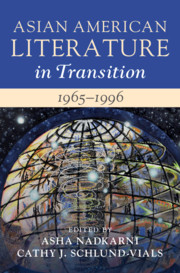Book contents
- Asian American Literature in Transition, 1965–1996
- Asian American Literature In Transition
- Asian American Literature in Transition, 1965–1996
- Copyright page
- Contents
- Contributors
- Series Preface
- Introduction
- Part I Immigration, Migration, and Movement
- Part II Politics, Art, and Activism
- Part III Institutionalization and Canon Formation
- Chapter 10 On Recovering Early Asian American Literature
- Chapter 11 Asian American Poetics
- Chapter 12 Maxine Hong Kingston’s The Woman Warrior: A Milestone in Asian American Literature
- Chapter 13 Making a Necessity of Extravagance: Work and Play in the Asian American(ist) Economy
- Chapter 14 Marking the Difference Made by “Heterogeneity, Hybridity, Multiplicity”: Lisa Lowe’s Impact on Asian American Studies
- Part IV Diaspora and the Transnational Turn
- References
- Index
Chapter 10 - On Recovering Early Asian American Literature
from Part III - Institutionalization and Canon Formation
Published online by Cambridge University Press: 08 June 2021
- Asian American Literature in Transition, 1965–1996
- Asian American Literature In Transition
- Asian American Literature in Transition, 1965–1996
- Copyright page
- Contents
- Contributors
- Series Preface
- Introduction
- Part I Immigration, Migration, and Movement
- Part II Politics, Art, and Activism
- Part III Institutionalization and Canon Formation
- Chapter 10 On Recovering Early Asian American Literature
- Chapter 11 Asian American Poetics
- Chapter 12 Maxine Hong Kingston’s The Woman Warrior: A Milestone in Asian American Literature
- Chapter 13 Making a Necessity of Extravagance: Work and Play in the Asian American(ist) Economy
- Chapter 14 Marking the Difference Made by “Heterogeneity, Hybridity, Multiplicity”: Lisa Lowe’s Impact on Asian American Studies
- Part IV Diaspora and the Transnational Turn
- References
- Index
Summary
Beginning in the early 1970s, scholars have been recovering an Asian American literary archive. The first anthologies of Asian American literature defined the field in divergent ways. Some focused on US-born writers and a politics of cultural nationalism. Others embraced a wider range of writers and a variety of political positions. The second wave of anthologies and scholarly discussions reacted against more limited views of Asian American literature and extended the field to encompass more women writers, genres such as poetry and drama, works written before the 1960s, and authors from beyond those of East Asian descent. Depending on the particular project, recovery has meant unearthing forgotten writings, revaluing discounted or discredited texts, or rethinking the sociopolitical context of works. Recovery continues today in print and digital editions released by both independent and mainstream publishers. Questions remain about which authors and works deserve recovery, and the stakes are high since inclusion in a canon can serve as a proxy for inclusion in a culture.
- Type
- Chapter
- Information
- Asian American Literature in Transition, 1965–1996 , pp. 187 - 207Publisher: Cambridge University PressPrint publication year: 2021

